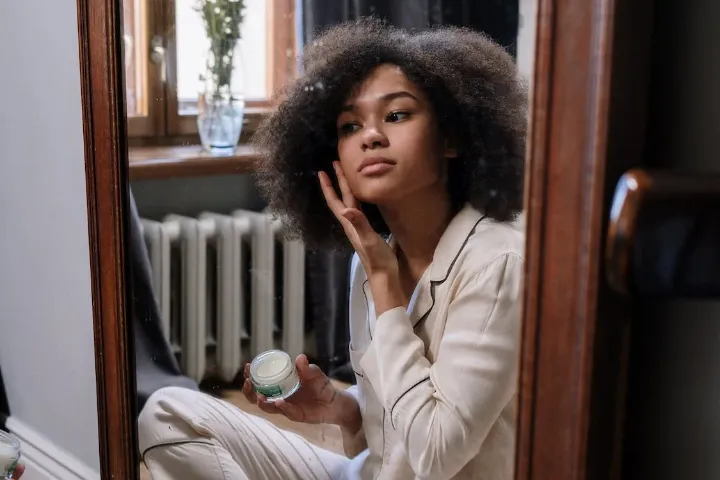The natural aging process causes your skin to age, losing some fullness. As you age, you tend to get visible lines, and your skin becomes drier and thinner. What you do to support your skin has to change as you get older, and you need to consider your lifestyle choices and environmental factors that can cause your skin to age prematurely. This guide looks at the various ways to keep your skin looking younger for longer.
Table of Contents
1. Moisturize properly
One of the keys to younger-looking skin is hydration. Dehydration can quickly result in dry and dull skin, emphasizing wrinkles and aging. Drinking enough water helps you to stay hydrated, but utilizing a nourishing moisturizer can go a long way toward maintaining a youthful look and feel from the inside out.
Moisturizers retain water under the surface layer of the skin, making it look more youthful. They contain emollients that strengthen the lipid barrier to hold in moisture and humectants that draw water from the air into the skin.
2. Try a NAD IV infusion
Cell death leads to visible signs of aging, including sagging, lines, and wrinkles. Your body naturally produces NAD, a powerful coenzyme influential in many processes in the body, such as supporting cellular health and repair. Factors such as aging and stress can deplete NAD levels.
A NAD IV infusion may help restore the levels and reverse damage at the cellular level, reduce fine lines and wrinkles, repair sun damage, flush free radicals from the body, and support new collagen formation.
3. Wear sunscreen daily
Most visible signs of skin aging are from sun damage caused by UVA and UVB rays. Whether running errands or relaxing at the beach, you need protection from these dangerous rays daily.

Sun-protective clothing like a wide-brimmed hat can help to protect your skin, but it does not eliminate the need to wear sunscreen. Choose a broad-spectrum sunscreen with an SPF of 30 or higher, and keep a lookout for a water-resistant one if you are going to swim.
4. Consider natural remedies
Natural remedies like virgin coconut oil and aloe vera help support the skin’s capacity to retain moisture and prevent flakiness and dryness, leaving your skin soft and smooth. Aloe Vera can help to reduce the appearance of sun damage such as freckles, dark spots, and light sunburn by forming a protective layer over burned skin that allows it to heal quickly.
Aloe is a common ingredient in many skin care products because it can increase cell production. Virgin coconut oil has anti-inflammatory properties and may act as a protective barrier for the skin; it may also heal blemishes on the skin and treat itchiness, flakiness, and redness.
5. Drink herbal tea
Drinking herbal tea can have many benefits for the skin. Rooibos tea contains high levels of zinc, antioxidants, and alpha-hydroxy acids. Zinc can help with hormonal balances that trigger acne and antioxidant-defending free radicals. Green tea is a potent antioxidant that can reactivate dying skin cells. Chamomile tea is a stress reliever that encourages quality sleep, essential for healthy skin.
6. Exercise and eat healthily
Moderate, daily exercise boosts your circulation and may impart a more vital and youthful appearance, and a diet containing excess sugars and refined carbohydrates can accelerate aging.
On the other hand, a healthy diet containing plenty of fresh fruit and vegetables may help prevent damage leading to premature aging. Fruits and vegetables contain phytonutrients that help your body to ward off damage from free radicals in the environment.
7. Cut down on smoking and reduce alcohol intake
Smoking can speed up the skin’s aging process by creating enzymes that damage the collagen in the skin, causing wrinkles and a dull complexion. If you want your skin to stay younger for longer, you need to cut down or preferably give up smoking.
Alcohol dehydrates the skin and produces cell-damaging free radicals, so drinking too much alcohol can cause significant damage over time. Reducing your alcohol intake can help your skin look younger.
8. Remember to exfoliate
Don’t forget to include exfoliation in your skincare regimen as it plays a crucial role. This step should be performed after cleansing to achieve a smooth, elastic, and radiant complexion. Exfoliation eliminates dead skin cells from the surface of your skin and promotes better blood flow, resulting in a more vibrant and luminous appearance. Especially during summer, it’s essential to eliminate dirt, oil, and sunscreen buildup from your skin. When selecting an exfoliating scrub, make sure to choose one that is appropriate for your skin type and avoid harsh chemicals if you have acne-prone skin.

What is glowing skin?
Glowing skin is skin that appears healthy, radiant, and youthful. It is characterized by a smooth texture, an even tone, and a natural glow or sheen that comes from within. Glowing skin is often associated with good health, a balanced diet, adequate hydration, and a consistent skincare routine that includes gentle cleansing, exfoliation, and moisturization.
Some common characteristics of glowing skin include:
- Even skin tone: Glowing skin has an even, consistent skin tone that is free from blemishes, dark spots, or discoloration.
- Smooth texture: Glowing skin is smooth to the touch, with a soft and supple texture that is free from roughness or flakiness.
- Hydration: Glowing skin is well-hydrated, with a dewy and plump appearance that reflects good skin health.
- Natural radiance: Glowing skin has a natural radiance or sheen that comes from within, giving the skin a youthful and healthy appearance.
- Minimal signs of aging: Glowing skin tends to show minimal signs of aging, such as fine lines, wrinkles, or sagging.
Last words
Your skin stays smooth and plump when you are young because it constantly regenerates. As you age, collagen production slows down; sun exposure, smoking, and other bad habits can damage existing collagen, which can make your skin age prematurely. The above tips can help you to keep your skin glowing and looking younger as you age.

